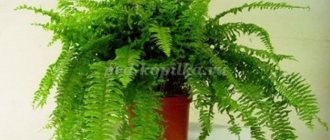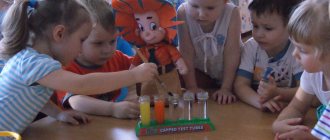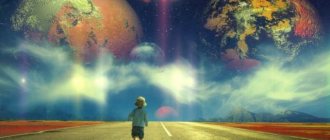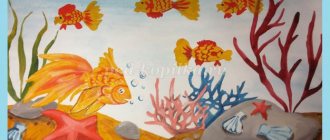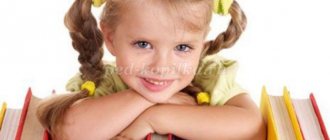Project of educational and research activities “I am a researcher”
Project “I am a researcher”
Relevance.
Experimentation
- an effective method of understanding the patterns and phenomena of the surrounding world and, more than ever, experimentation is one of the pressing problems of our time.
Children's experimentation has enormous developmental potential. Its main advantage is that it gives children real ideas about the various aspects of the object being studied, about its relationships with other objects and the environment.
The experiment enriches the child’s memory, activates his thought processes, and includes an active search for solutions to problems, i.e. experimentation is a good means of intellectual development of preschoolers.
In children's experimentation, children's own activity, aimed at obtaining new knowledge and information, is most powerfully manifested.
For preschool children, experimentation, along with play, is a leading activity.
Experimentation is closely related to all types of activities, and primarily to those such as observation and work. Observation is an indispensable component of any experiment, since with its help the perception of the progress of work and its results is carried out.
Experimentation and speech development are very closely related. This can be clearly seen at all stages of the experiment - when formulating the goal, during the discussion of the methodology and progress of the experiment, when summing up the results and giving a verbal report of what was seen.
The connection between children's experimentation and visual activity is also two-way. The more developed a child’s visual abilities are, the more accurately the result of a natural history experiment will be recorded.
The connection between experimentation and the formation of elementary mathematical concepts does not require special proof. During experiments, there is a constant need to count, measure, compare, determine shape and size, and perform other operations. All this gives mathematical concepts real significance and contributes to their understanding. At the same time, mastery of mathematical operations facilitates experimentation.
Project typology:
The project is complex in nature - it includes research, creative, educational and practical activities.
Implementation deadlines
: short-term – 2 months (February, March)
Project participants:
children of the preparatory group, parents of pupils, teachers.
Objective of the project:
“Development of cognitive abilities of preschool children through experimentation.”
Project objectives:
– to form dialectical thinking in preschool children, i.e. the ability to see the diversity of the world in a system of relationships and interdependencies;
– develop your own cognitive experience in a generalized form using visual aids (standards, symbols of conditional substituents, models);
– expand the prospects for the development of children’s search and cognitive activity by including them in thinking, modeling and transformative actions;
– support children’s initiative, intelligence, inquisitiveness, criticality, and independence.
Methods and technologies for project implementation:
project method; person-oriented technologies; educational activities and games - experimentation, conversations with children, productive activities.
Resource support for the project
.
Methodical:
1. “The unknown is nearby. Experiences and experiments for preschoolers”, Dybina O.V., Rakhmanova N.P., Shchetinina V.V., 2010
2. “Experimental activities of children of middle and senior preschool age”, Tugusheva T.P., Chistyakova A.E., 2010.
3. “Organization of experimental activities for children aged 2-7 years”, Martynova E.A., Suchkova I.M., 2011.
4. “Games with water and sand”, Ryzhova N.V., Hoop No. 2, 1997
5. “Experiments with sand and clay”, Ryzhova N.V., Hoop No. 2, 1998
6. Educational holidays and leisure activities for preschoolers. L.A. Naumova, 2003
7. Scenarios of musical calendar and folklore holidays. M.A. Davydova, 2007
8. “Secrets of water” by L. Orlova, M. Kretov, S. Leonenko. Musical director No. 2, 2013
Logistics:
– a selection of advisory material for teachers and parents;
– development of a group project, lesson notes and games
– experimentation; – selection of illustrations, children’s literature; – preparation of equipment and materials for experimentation and productive activities of children; – design of a “children’s laboratory in a group.
Stages of the project.
I. Preparatory
(motivational, informational and accumulative).
1. Preparing teachers for work.
Analysis of methodological literature.
A selection of stories, paintings, illustrations on the topic “Experiments, experimentation for preschoolers.”
Development of a long-term thematic plan for working with children.
Preparation of didactic and practical material for conducting experiments.
2.Cooperation with parents.
Design of informational and educational material in the form of mobile folders.
Development of recommendations for parents on conducting experiments with children at home.
Involving parents in participating in activities within the project:
– A selection of illustrations, paintings; collection of information.
– Creation of albums together with children on conducting experiments.
– Selection of materials and assistance in laboratory design.
3. Preparatory work with children.
– Conversation and viewing illustrations, viewing presentations on the topic “Water”, reading fiction: who are scientists; What is a laboratory and its purpose?
– Conducting experiments with objects of living and inanimate nature: water, sand, air, stones.
Approximate algorithm for a group project
Motivation for choosing a topic. Three Question Model.
1.What do we know?
Developmental questions to ask children:
– why do we need a laboratory in the group?
– Why are experiments needed?
– remember what experiments were carried out, what was learned as a result of them, what interesting things did you remember?
2. What do we want to know?
– What is a magnifying glass?
– What substances does water dissolve?
3. What do you need to do to find out?
– Purchase equipment for the laboratory for experiments.
– Carry out experiments and experiments.
– Ask your questions to parents and teachers, read books with them, look up information in encyclopedias.
- Tell each other about what you learned.
II. Practical.
Forms of organization of the educational process
In different types of children’s activities in the “Teacher – Child – Parents” system
”
Work with children
| Month (period) | Forms of work |
| February | Conversation “What is a laboratory? Why is it needed? |
| March | Experiment “What kind of water is there?” Goal: to clarify children’s understanding of the properties of water: transparent, odorless, has weight, does not have its own shape; introduce the principle of operation of a pipette and funnel. Experiment “Water is a solvent. Water purification.” Purpose: to identify substances that dissolve in water; introduce the method of water purification - filtration; consolidate knowledge about the rules of behavior when working with various substances. Integrated educational activities "Secrets of Water" Experiment “Water coloring”. Purpose: to introduce children to observation devices - a magnifying glass, to explain why a person needs them. Experiment “Multi-colored icicles”. Goal: to realize your ideas about the properties of water (transparency, solubility, freezing at low temperatures), obtained during research activities. Experiment “Solid water. " Purpose: to clarify children’s understanding of the properties of ice: transparent, hard, shaped, when heated, it melts and turns into water Conversation “The Journey of the Droplet.” Goal: to introduce children to the water cycle in nature, to identify the causes of precipitation in the form of rain and snow; expand children’s understanding of the importance of water for human life; develop social skills in children; the ability to work in a group, negotiate, take into account the partner’s ability to prove the correctness of his opinion. Educational entertainment “Water Sorceress” Together with the parents of the students. |
Design of an electronic presentation, design of a children's album on experimentation; design of an exhibition of children's drawings on the theme “Water Among Us”; presentation of the results of work with children for parents and teachers
Working with parents
| Month | Forms of work |
| February | Conversation at home with children: who are scientists; what is an experiment? |
| Invite parents to purchase for experiments: straws, pipettes, gauze, vessels of various shapes, oilcloth, mesh for experiments and experiments. | |
| March | Invite parents to conduct an experiment with water at home with their children. (Family of Kirilycheva Anya) |
| Invite parents to conduct “water coloring” experiments at home | |
| Help parents carry out experiments by bringing magnifying glasses, binoculars, and colored glasses. | |
| Organize parents for a final joint leisure-entertainment “Water Sorceress” (Parent participants: Zhurova E.V., Kirilycheva E.Yu.) |
III. Generalizing.
Assessment of the implementation of the project by children: conversation “What did we want to know, what did we learn and do, why?”
Presentation of activity products.
Expected results.
For children.
– Children will develop an idea of the relationship between nature and humans.
– Children will master ways to practically interact with the environment
– Personal qualities will be formed according to the age of the children: cognitive activity and interest, independence, creativity, initiative.
For teachers.
Generalization of teaching experience, introduction of innovative technologies and new forms of work on children's experimentation.
Increasing the theoretical and professional level of teachers through mastering the project method in working with children.
